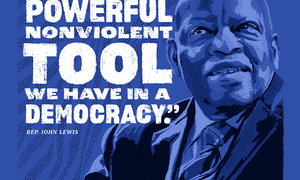“The Vote Is Precious”
The anniversary of the Jan. 6 insurrection at the U.S. Capitol is a reminder of the dangers to our democracy and an essential part of honestly confronting our nation’s history as we contextualize the present moment.
We offer this new One World poster with a quote from Rep. John Lewis as a preview of our upcoming “Democracy for the 21st Century” publication and to begin our conversations on democracy this year. And we share a look back at Rep. Lewis’ reflections, which remain relevant and vital in 2026.
- John Lewis
- Reflections on a Dream Deferred
- Media Literacy Is Vital for Informed Decision-Making
